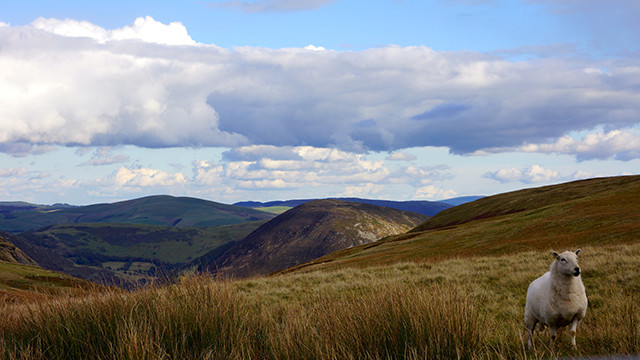
by Ward Chesworth Tuesday, March 27, 2018

Credit: Sam Romilly CC BY-SA 2.0
Tom, he was a piper’s son, He learnt to play when he was young, And all the tune that he could play Was “Over the Hills and Far Away."
– Children’s nursery rhyme, author unknown
English author G.K. Chesterton thought that “over the hills and far away” was the most poetic line in all of literature. The tune “Over the Hills and Far Away” mentioned in the nursery rhyme is a traditional British song from the late 17th or early 18th century. It was a siren’s song that promised wonder and adventure beyond the blue horizon. Gwyn Thomas, a fine though neglected Welsh writer, heard the song during his early-20th-century childhood in the Rhondda Valley, the heart of the south Wales coal region. Honeycombed by mines, the Rhondda’s spirit lay at the core of Thomas’ heart and imagination, and he distilled a mordant humor from the dark vibes of the life that he knew there.
In his autobiography, “A Few Selected Exits,” Thomas tells the tale of trying to walk over the hills and far away during his youth. The back door of Thomas’ childhood home looked out onto a hill called Arthur’s Crown, and his father Walter promised that some coming Sunday he would take Gwyn and his siblings over the hill to the town of Mountain Ash some 10 kilometers distant. Walter described Mountain Ash as an earthly paradise, where wealthy aunts and cousins lived in opulent ease. Their goodness, beauty and wealth would undoubtedly bring “new dimensions of joy into our lives,” he promised.
A dozen times they set out over the hill and a dozen times they failed to reach Mountain Ash. The long walk invariably raised in Walter a thirst “it would have taken two fire-brigades to put out,” Gwyn wrote. The law in that era mandated that all pubs in Wales should be closed for the Sabbath. Fortunately (for Walter, unfortunately for the kids), Walter enjoyed a warm enough acquaintance with the landlord and landlady of the village pub in Llanwonno that they were happy to flout the law for him. So, that was where the pilgrimage ended every time, only halfway to Mountain Ash. As Walter and his friends quaffed ale in the cool stone-flagged bar, reminiscing and laughing over a long afternoon, the children were content to drink lemonade as they played outdoors. The hours passed by, and with the red sky of evening sliding westwards, the kids would pilot their remorseful and unsteady dad back home. The Promised Land was again postponed for a Sunday in the indefinite future.
I first heard the siren call of Tom the piper’s song on the site of an old Roman fortress at the end of World War II. Now called Castle Hill, it is the highest point in the town where I was born in northwestern England. From the highest west-facing window of a friend’s house on Castle Hill, I would look out across rural Cheshire. Beyond the town, I saw a plain so flat that the River Dane meandered about looking for a downward direction to flow. Farther away, blue distance became indistinguishable from sky, except after a good rain. Only then, through the washed atmosphere, could you see a low range of hills marking an outcrop of Triassic sandstones on the horizon. Strain your eyes to the utmost and you might convince yourself that you could see a vague grayness that you figured hid the Paleozoic mountains of North Wales. Anything you saw beyond that — Ireland, the Atlantic Ocean, North America — was only in the mind’s eye. It was at least 15 years later that Ann Veronica and I, newly married, decided to travel over those hills and across an ocean to far-off Canada.
“The past is another country,” wrote British author L.P. Hartley, a saying that’s literally true for an immigrant. For us, the past is 1950s Manchester, a patently grim chunk of the industrial revolution, uniformly blackened by a century and a half of coal smoke and, as often as not, shrouded in smog. So in midwinter, we sailed across the sea from Liverpool, our immigration made easy with fares subsidized by the Canadian government. When I disembarked from the Canadian Pacific boat Empress of Britain onto the frigid docks of Saint John, New Brunswick, I don’t believe I had ever experienced such cold — until it got even worse in Montreal, where the immigrant train took us. Since then, I’ve survived some six decades in Ontario or Pennsylvania, enduring winters so cold even a Scotsman would put on pants.
Hartley could just as well have said “the future is another country.” That would have been an emigrant’s point of view. I would have liked to have been able to tell Gwyn Thomas that when Ann Veronica and I settled in our final home together in a small village in southern Ontario, we planted a Rowan tree out front. He would have known the tree as Mountain Ash and, more than 50 years later, the tree still flourishes as a symbol of the Promised Land achieved.
© 2008-2021. All rights reserved. Any copying, redistribution or retransmission of any of the contents of this service without the expressed written permission of the American Geosciences Institute is expressly prohibited. Click here for all copyright requests.